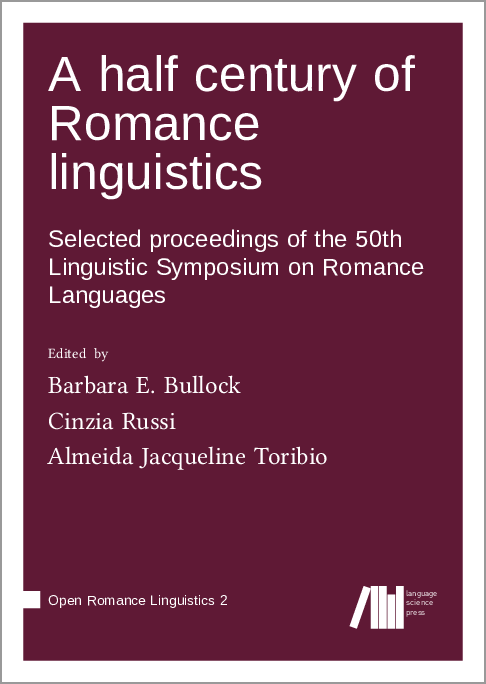We log anonymous usage statistics. Please read the privacy information for details.
A half century of Romance linguistics: Selected proceedings of the 50th Linguistic Symposium on Romance Languages
Synopsis
The present volume presents a selection of the revised and peer-reviewed proceedings articles of the 50th Linguistic Symposium on Romance Languages (LSRL 50) which was hosted virtually by the faculty and students from the University of Texas at Austin. With contributions from rising and senior scholars from Europe and the Americas, the volume demonstrates the breadth of research in contemporary Romance linguistics with articles that apply corpus-based and laboratory methods, as well as theory, to explore the structure, use, and development of the Romance languages. The articles cover a wide range of fields including morphosyntax, semantics, language variation and change, sociophonetics, historical linguistics, language acquisition, and computational linguistics. In an introductory article, the editors document the sudden transition of LSRL 50 to a virtual format and acknowledge those who helped them to ensure the continuity of this annual scholarly meeting.
Chapters
-
The digital transformation of the LSRLThe first 50 years of Romance linguistics in the Americas ends virtually
-
For an integrative approach to variation and change in French nasal vowel systems
-
Assessing change in a Gallo-Romance regional minority language1pl verbal morphology and referential restriction in Picard
-
The partial loss of free inversion and of referential null subjects in Brazilian Portuguese
-
The antipassive as a Romance phenomenonA case study of Italian
-
The role of SE in Spanish agreement variation
-
Object control into temporal adjunctsThe case of Spanish clitics
-
Overt vs. null subjects in infinitival constructions in Colombian Spanish
-
Oblique DOM and co-occurrence restrictionsHow many types?
-
A superlative challenge for a syntactic account of connectivity sentences
-
Revisiting sociophonetic competenceVariable spectral moments in phrase-final fricative epithesis for L1 & L2 speakers of French
-
Does social identity play a role in the L2 acquisition of French intonation?Preliminary data from Canadian French-as-a-second-language classroom learners
-
Sociophonetic analysis of mid front vowel production in Barcelona
-
Prosodic correlates of mirative and new information focus in Spanish wh-in-situ questions
-
Mechanical vs. functional processes in subject pronoun expression in Spanish second language learners
-
Frequency and efficiency in Spanish proverbs




